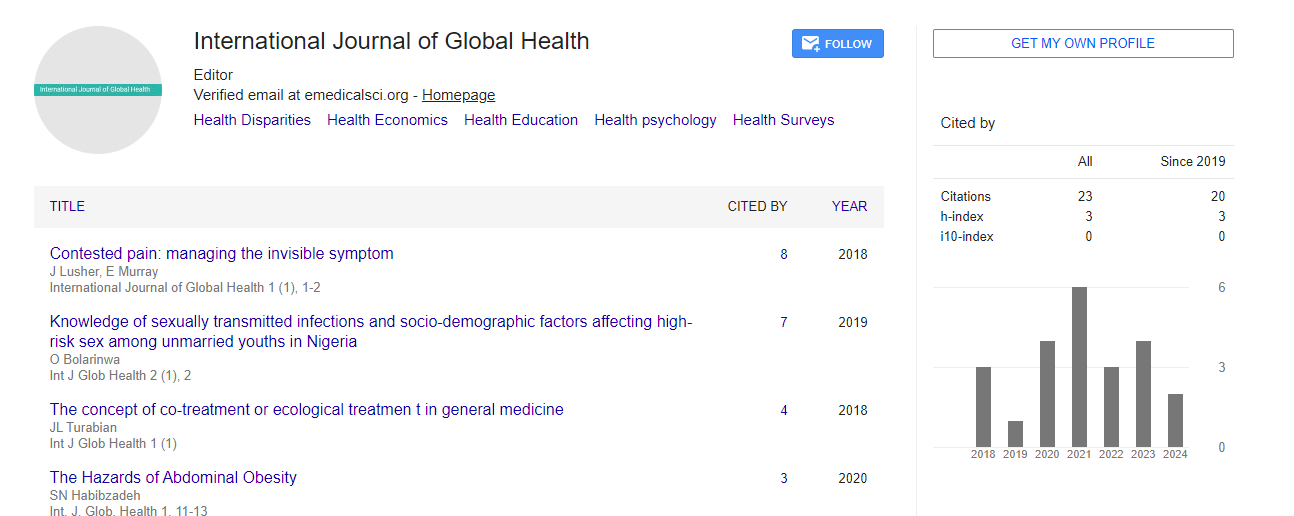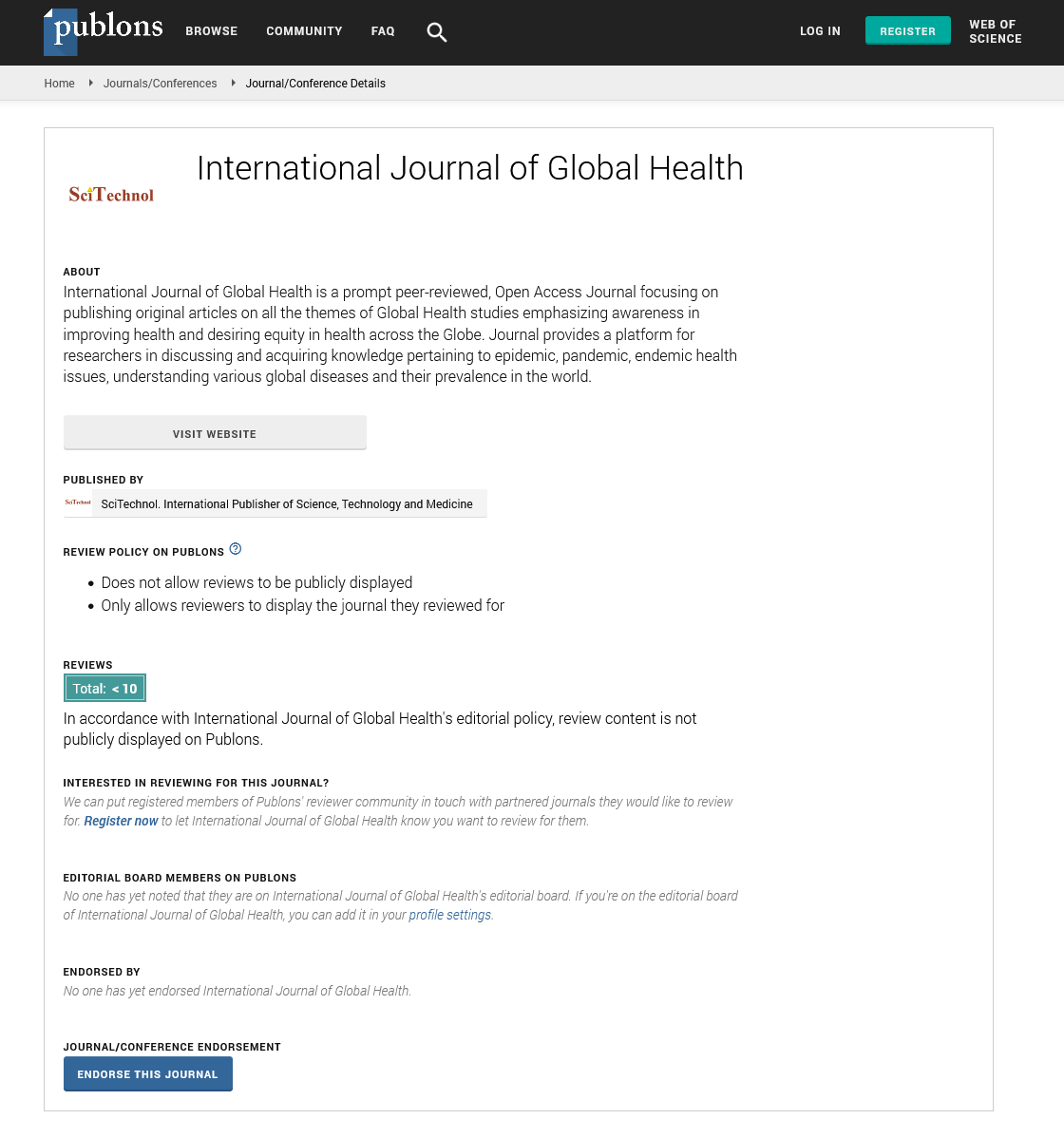Commentary, Int J Glob Health Vol: 6 Issue: 2
Health Surveys: Finding Insights for Informed Public Health Decisions
Kollmann Perkins*
1Department of Internal Medicine, University of Adelaide, Adelaide, Australia
*Corresponding Author: Kollmann Perkins,
Deparment of Internal Medicine,
University of Adelaide, Adelaide, Australia
E-mail: perkins@kol.au
Received date: 24 May, 2023, Manuscript No. IJGH-23-107358;
Editor assigned date: 26 May, 2023, PreQC No. IJGH-23-107358 (PQ);
Reviewed date: 09 June, 2023, QC No. IJGH-23-107358;
Revised date: 16 June, 2023, Manuscript No. IJGH-23-107358 (R);
Published date: 23 June, 2023 DOI: 10.4172/Ijgh.1000182
Citation: Perkins K (2023) Health Surveys: inding Insights for Informed Public Health Decisions. Int J Glob Health 6:2.
Description
Health surveys are invaluable tools in capturing data about the health status, behaviors, and healthcare needs of populations. They provide a systematic approach to gathering information, allowing public health professionals and policymakers to make informed decisions, develop targeted interventions, and monitor health trends. This study will explore the significance of health surveys, their methodologies, applications in public health, and their role in shaping evidence-based policies.
Understanding health surveys
Health surveys are comprehensive data collection instruments designed to gather information on various aspects of health, including demographics, health behaviors, disease prevalence, healthcare access, and health-related quality of life. They typically involve structured questionnaires, interviews, or self-reporting mechanisms to collect data from a representative sample of the population [1]. The collected data is then analyzed and used to inform public health strategies, policy development, and resource allocation.
Types of health surveys
Several types of health surveys exist, each serving specific purposes. Population-based surveys, such as national health surveys, aim to provide a snapshot of the health status and needs of an entire population. Household surveys collect data from individual households and provide information on health-related behaviors, access to healthcare, and socioeconomic factors. Specialized surveys focus on specific health topics or target specific populations, such as surveys on mental health, sexual behavior, or chronic diseases [2,3].
Methodologies and sampling
Health surveys employ various methodologies and sampling techniques to ensure data representativeness and reliability. Random sampling is commonly used, where participants are selected randomly from the target population, ensuring equal opportunity for inclusion. Stratified sampling may also be employed, where the population is divided into subgroups based on certain characteristics to ensure adequate representation from each group. Additionally, surveys may be conducted face-to-face, over the phone, through online platforms, or a combination of methods, depending on the target population and resources available [4].
Applications in public health
Health surveys have wide-ranging applications in public health, providing critical insights that guide decision-making and interventions. They play an important role in assessing disease prevalence, tracking health behaviors, and identifying health disparities across populations. Surveys inform public health priorities by highlighting areas of concern, such as high rates of chronic diseases or low immunization rates. They also monitor progress and evaluate the effectiveness of public health interventions, allowing for evidence- based adjustments to improve health outcomes [5,6].
Identifying risk factors and determinants of health
Health surveys contribute to the identification of risk factors and determinants of health. By collecting data on lifestyle choices, socioeconomic factors, and environmental influences, surveys help identify factors that contribute to disease development and poor health outcomes. For example, surveys may reveal high smoking rates, sedentary lifestyles, or lack of access to healthy food options. Such insights enable the development of targeted interventions to address these risk factors, promoting healthier behaviors and reducing the burden of disease [7].
Monitoring health trends
Health surveys play a vital role in monitoring health trends over time. By conducting surveys periodically, public health professionals can observe changes in disease prevalence, track the effectiveness of interventions, and identify emerging health concerns. Longitudinal surveys, which follow participants over an extended period, provide valuable data on health trajectories, identifying patterns and associations between risk factors and health outcomes. Monitoring health trends through surveys enables proactive public health planning and the timely implementation of interventions [8,9].
Informing evidence-based policies
Health surveys are instrumental in shaping evidence-based policies. By providing robust data on health needs, disparities, and determinants, surveys inform policymakers about the impact of health-related decisions. Surveys can identify gaps in healthcare access, unmet health needs, and inequities across populations, influencing policy formulation to address these issues. Additionally, survey data may guide resource allocation, influencing funding decisions and ensuring that healthcare services and programs are targeted where they are most needed.
Challenges and considerations
Health surveys face challenges and considerations that must be addressed to ensure data accuracy and reliability. Response rates, for example, can impact data representativeness, as low response rates may introduce bias. Survey design, question phrasing, and participant understanding also require careful consideration to ensure data validity. Additionally, privacy and confidentiality concerns must be addressed to protect participant information and ensure ethical practices throughout the survey process [10].
Conclusion
Health surveys play a vital role in capturing data on population health, behaviors, and healthcare needs. They provide valuable insights that inform public health decisions, policy formulation, and the development of targeted interventions. By employing rigorous methodologies and representative sampling techniques, health surveys offer a comprehensive understanding of health trends, risk factors, and determinants. As public health challenges continue to evolve, health surveys will remain essential tools in equipping policymakers and public health professionals with the data-driven knowledge necessary to improve health outcomes and create healthier communities.
References
- Raghupathi W, Raghupathi V (2018) An empirical study of chronic diseases in the United States: A visual analytics approach to public health. Int J Environ Res Public Health 15(3):431.
- Hilbert M (2016) Big data for development: A review of promises and challenges. Dev Policy Rev 34(1):135-174.
- Larson HJ, De Figueiredo A, Xiahong Z, Schulz WS, Verger P et al (2016 ) The state of vaccine confidence 2016: Global insights through a 67-country survey. EBioMedicine 12:295-301.
- Osborne RH, Batterham RW, Elsworth GR, Hawkins M, Buchbinder R (2013) The grounded psychometric development and initial validation of the Health Literacy Questionnaire (HLQ). BMC Public Health 13(1):1-7.
- Mascarenhas MN, Flaxman SR, Boerma T, Vanderpoel S, Stevens GA (2012) National, regional, and global trends in infertility prevalence since 1990: A systematic analysis of 277 health surveys. PLoS Med 9(12):e1001356.
- Tolley EE, Ulin PR, Mack N, Robinson ET, Succop SM (2016) Qualitative methods in public health: A field guide for applied research. JWS 6(8):19.
- Padel S, Foster C (2005) Exploring the gap between attitudes and behaviour: Understanding why consumers buy or do not buy organic food. Br Food J 107(8):606-625.
- Wang Y, Kung L, Byrd TA (2018) Big data analytics: Understanding its capabilities and potential benefits for healthcare organizations. Technol Forecast Soc Change 126:3-13.
- Reece AG, Danforth CM (2017) Instagram photos reveal predictive markers of depression. EPJ Data Sci 6(1):15.
- Weinstein MC, O'Brien B, Hornberger J, Jackson J, Johannesson M et al (2003) Principles of good practice for decision analytic modeling in health-care evaluation: Report of the ISPOR task force on good research practices—Modeling studies. Value Health 6(1):9-17.
 Spanish
Spanish  Chinese
Chinese  Russian
Russian  German
German  French
French  Japanese
Japanese  Portuguese
Portuguese  Hindi
Hindi 
